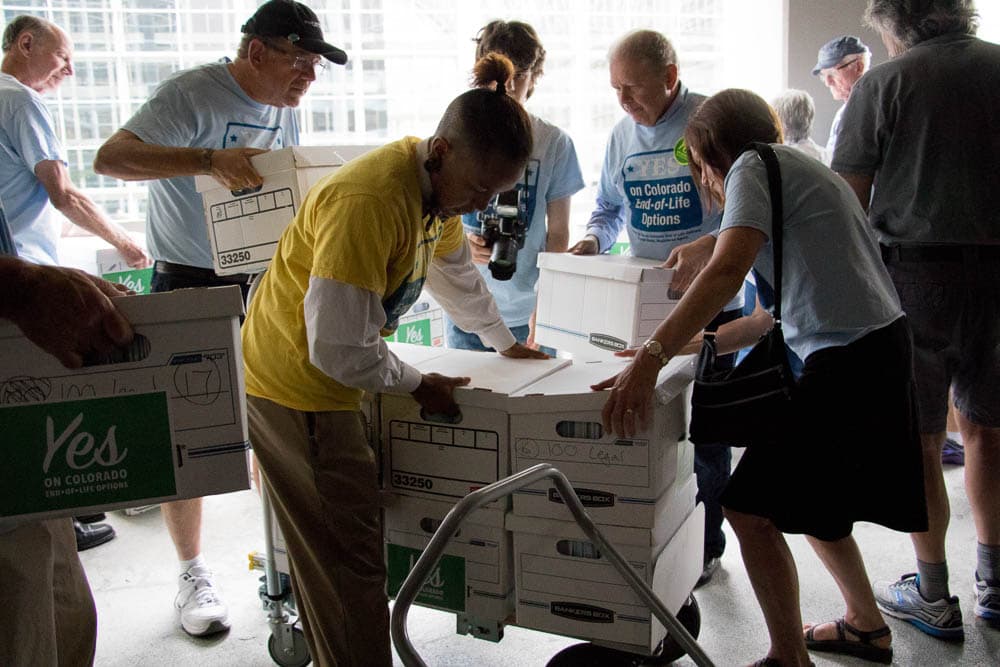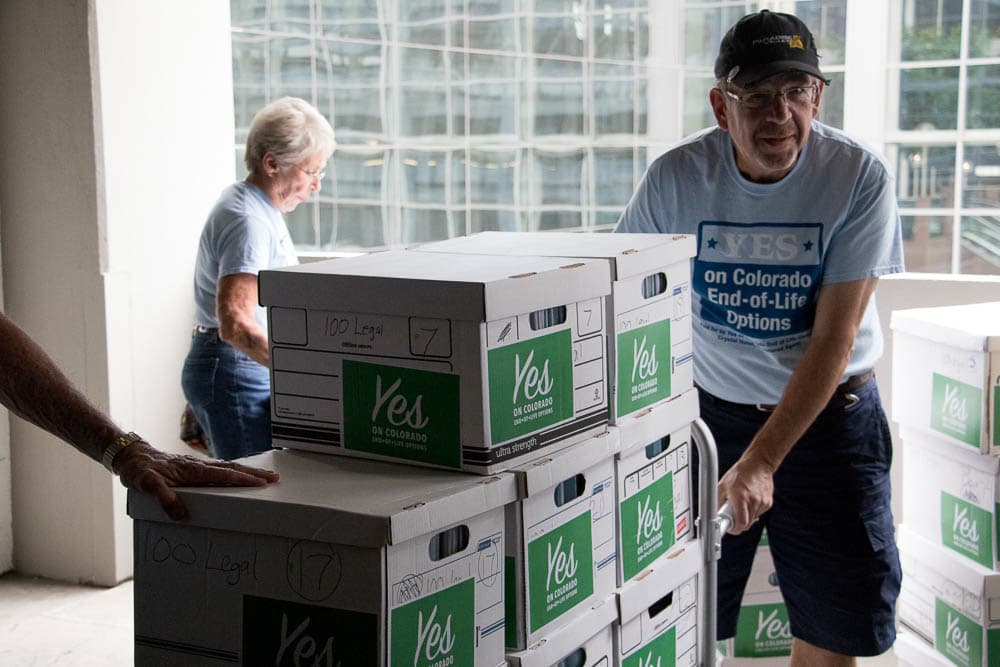
It's very likely that Coloradans will vote this fall on the "right to die."
Advocates for Colorado End of Life Options collected about 158,000 signatures — well over the 100,000 needed for the petition to go on the November ballot.
The petitioning officially ended Thursday. A group of close to 30 volunteers from the sponsor organization, Compassion & Choices, met to submit signatures for review at the Secretary of State.
If it's approved, Colorado would be the sixth state to allow doctors to prescribe lethal doses of barbiturates to patients with terminal illnesses.
As it stands, Colorado End of Life Options would include the following requirements:
- Must be over 18 and a resident of Colorado
- Must be in the final stages of a terminal illness with a prognosis of six months or less, as confirmed by two physicians
- Mentally capable
- Must self-administer the medication
- Must make an informed, voluntary request including two oral requests separated by a 15-day waiting period. A third written request, signed by at least two witnesses, is also required
- Have the right to rescind the request for medication at any time.
This won't be the first time Colorado advocates have attempted to legalize aid-in-dying.
Medical aid in dying has been a contested issue in Colorado since 1995, when the first aid-in-dying bill was defeated in the state House. A bill was defeated in the Colorado House of Representatives in 2015 and failed again in the House and Senate in 2016.
After the defeat, advocates took the matter into their own hands and launched a petition on June 21 to take the battle to the ballot box. More than 500 volunteers from Compassion & Choices, in combination with the canvassing organization Grassroots Campaigns, worked for 30 days to collect the signatures.
The organization says its polls, conducted in 2014, show healthcare professionals and the public are generally in favor of the initiative. Separately, the Medscape news source found 54 percent of physicians approved of aid in dying.
But there are still strong opponents of the measure.
Carrie Ann Lucas, an attorney and spokesperson for the disability advocacy organization Not Dead Yet, worries the initiative provides opportunity for abuse.
“... We believe that it does not provide safeguards against mistakes, coercion and abuse,” Lucas said. Lucas herself suffers from a neuromuscular disease that makes her dependent on a ventilator.
“There’s nothing to prevent me from calling up Compassion & Choices and doctor shopping," she added. In other words, she worries that if one doctor denies a patient, they can just ask another.
Lucas said her attended care alone costs close to $1000 per day. She argued that the lethal prescription is much more affordable than her continued care. Basically, end-of-life options could make dying more financially appealing than staying alive, she said, which could put impoverished people at risk of coercion by family members.

Aid in dying advocates disagree.
Barbara Coombs Lee, the president of Compassion & Choices, flew out to Denver to assist with the petition signatures. Coombs Lee believes that Colorado End of Life Options “is absolutely safe enough.”
She cited the support of bioethicist Art Caplan and the lack of evidence of abuse or coercion in Oregon in the more than 20 years since its Death with Dignity bill passed.
“Affordability is a red herring,” Coombs Lee said. “People considering end-of-life options are in hospice, they are not still receiving treatment. There is no incentive for coercion.”
“The heart of this campaign is preventing undue suffering and allowing people the option to avoid suffering,” she said.
Matt Larson, 36, was diagnosed with a stage 3 Anaplastic Oligodendroglioma brain tumor in May 2015. Since then, his days have been filled with radiation, chemotherapy and surgery. He has a 50/50 chance of emerging this fall cancer-free.
“I know the agonizing way you can die of brain cancer, and I will fight as hard and long as I can,” he said. “In the event that my death is inevitable, I don't want to needlessly suffer.”
Larson, along with his family and friends, supports Colorado End of Life Options. He said that he doesn’t know that he would use it, but it would bring him comfort to know the option was there.
“I've heard it described as medically assisted suicide,” he said. “Suicide is for people who don't want to live. I desperately want to live, I just don't want to suffer needlessly.”
Petition signatures for Colorado End of Life Options will be tallied Monday at the Secretary of State's office at 1700 Broadway in Denver. Not Dead Yet has planned to protest there that day.
Multimedia business & healthcare reporter Chloe Aiello can be reached via email at [email protected] or twitter.com/chlobo_ilo.
Subscribe to Denverite’s newsletter here.











